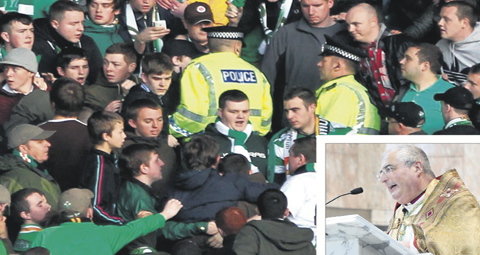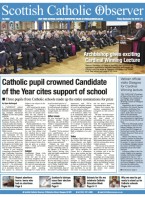BY Ian Dunn | November 25 2011 | ![]() 0 COMMENTS
0 COMMENTS ![]() print
print

Police moving the goalposts?
Publication Date: 2011-11-25
— Bishop Tartaglia criticises policing of football matches; Committee passes anti-sectarian bill
Bishop Philip Tartaglia of Paisley has expressed concern at over zealous and ‘almost provocative’ policing of club football matches in Scotland.
The bishop said he was ‘distinctly uncomfortable’ at the way he was searched and treated during a recent Celtic away game in Aberdeen.
He was speaking as the Scottish Government moved forward with legislation intended to decrease sectarian behaviour surrounding the sport and as new Crown Office figures show Catholics are twice as likely to be the victims of religiously aggravated offences compared to Protestants, but that the bulk of such crime takes place away from football stadiums.
Confrontational
Bishop Tartaglia took issue with police behaviour at Celtic’s Scottish Premier League match at Aberdeen’s Pittodrie stadium this season, saying the behaviour of Grampian Police inflamed the crowd. “We were body searched by stewards under the glare of police, and when we took our seats a police officer started intently filming the Celtic supporters and we were in the middle of them,” he said of the August 7 game. “I felt distinctly uncomfortable.”
The bishop said the threatening nature of the surveillance had risked aggravating the crowd.
“The fans had been quiet and good natured, but I could feel the tension growing,” he said. “It was an unnecessary provocation of a peaceful crowd. It was an almost hostile surveillance. It was as if they were saying: ‘We’ve got the power, we can identify you and put you in jail.’ Suddenly, there was a change in the atmosphere and the focus was on the police, instead of the game.”
Police response
A spokesperson said Grampian Police does not believe its officers were over zealous at the match as they had ejected no-one from the ground during that game and only a single arrest had been made, outside the stadium for breach of the peace.
However, in a separate incident, Strathclyde Police this week has admitted that its officers made a ‘mistake’ in confiscating a scarf featuring Pope Benedict XVI from a teenage boy at a Celtic versus Rangers match earlier this year. The 16-year-old was wearing a scarf emblazoned with the Pope’s image, designed to mark the visit of the Holy Father to Scotland last year.
A spokeswoman for Strathclyde Police said the force made an error in confiscating the scarf during an Old Firm match last season. “A scarf was removed from a boy at a football game held at Ibrox and we acknowledge that this was a mistake on our officers’ part,” she said. “This matter was raised at a recent meeting with the Catholic Church and a full explanation was given by police, which was accepted.”
Peter Kearney, director of the Scottish Catholic Media Office, said the Church had accepted the police’s apology on the scarf incident.
“Bishop Tartaglia and I had a meeting with Assistant Chief Constable Campbell Corrigan and as far as we’re concerned that is the end of the matter,” Mr Kearney said. “Incidents like that and the heightened tension around sectarianism mean it’s very important that the police have as much outside expert input as possible. We made an offer to meet with Strathclyde Police’s sectarianism unit, and, to date, it hasn’t been taken up, but we hope it will be.”
Sectarian offences
Last week also saw the release of the Crown Office’s statistical analysis of sectarian offences—offences that have ‘no place in a civilised society’—and figures which made for depressing reading for Catholics, according to Bishop Tartaglia.
The figures recorded 400 religiously motivated crimes against Catholics in the financial year 2010-2011, amounting to nearly 60 per cent of all crimes of this nature. The figures also show there were recorded religious hate crimes in 27 out of Scotland’s 32 local authority areas with the majority, 79 per cent, taking place in the Strathclyde Police Force area.
“Catholics will take little comfort from the fact that they were previously five times more likely to suffer a sectarian attack than anyone else and are now 4.5 times more likely,” the bishop said. “Since Catholics represent just 16 per cent of Scotland’s population, the fact that they account for almost 60 per cent of the victims of sectarian crime reflects poorly on modern Scotland and is an indicator of entrenched hostility on a worrying scale.”
The bishop added that it was disappointing it had taken so long for these figures to be released.
“Although it has taken five years and repeated requests and in spite of the fact that in the intervening period hundreds of Crown Office documents have been destroyed thus preventing a more complete and balanced analysis,
this report does nonetheless make a useful contribution to the sectarianism debate,” he said.
The report also shows only 13 per cent of sectarian offences occurred near a football stadium, a fact Bishop Tartaglia said shows the need for a fresh approach to sectarianism.
“It remains the case that the overwhelming majority of sectarian incidents are not football related,” he said. “Therefore, far more engagement is needed with the Church in future by all public authorities committed to the eradication of religious intolerance. I restate the willingness and the readiness of our Church officials to assist Strathclyde Police in their efforts to understand and monitor religiously aggravated behaviour.”
Scottish Government response
Contrary to the bishop, Community Safety Minister Roseanna Cunningham claimed the figures underlined the need for the Offensive Behaviour at Football Bill currently going through Holyrood.
The Scottish Parliament’s justice committee passed the last amendments to the bill on Tuesday.
Labour’s two MSPs on the committee abstained on every vote on amendments to the bill, with James Kelly saying the bill was ‘not fit for purpose.’ The committee did agree to insert a new freedom of expression clause into the legislation, which is intended to allay fears that the legislation could be used to prevent open discussion. Due to the SNP’s majority, MSPs are expected to vote the legislation into law next month and it will come into force in the New Year.










